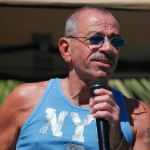Brooklyn, New York
Positive since 1986
The following speech was delivered on December 1, 2016 at the World AIDS Day celebration of HIV long-term survivors at Judson Memorial Church in New York City.
Good evening, everyone.
As a heterosexual Black young man, I used to see myself as the nameless, seemingly anonymous narrator of the Ralph Ellison literary classic Invisible Man. I was college-educated yet still struggling to matter in a racially complicated United States that found it easier to see me as a thug, a plain old nigger on the block or someone to watch and fear. In the story, the narrator actually introduces himself as a man, not a ghost, describing the nature of his invisibility to be his Blackness—Blackness meaning irrelevance in a white world.
Once I was diagnosed HIV positive at 19, I saw myself as that ghost as well. A ghost not just because the doctor at the downtown Norfolk, Virginia, Red Cross said in 1986 that I had eight to nine years left to live. Not a ghost because of multiple attempted suicides, which angrily determined that I would be the cause of my own demise before I would succumb to an unwelcome virus determined to drain the life out of me, one white blood cell at a time. No, I felt like a ghost because others refused to see my heterosexuality. They rationalized that because I am HIV positive that I must be gay, an addict, hve been in jail or, clearly, must have done something to deserve it.
In my ghostlike state, I lived underground, accepting death as inevitable and deserved. My tumultuous and tortured years included surviving murder attempts, addiction and homelessness. I was certain that my self-destructive soul would put an end to my horrific waking nightmares.
However, like the Invisible narrator, I found enlightenment and hope in the light that refused to fade within me. I was also rescued by the light, warmth and faith of my mother Cecelia, who refused to allow me to be buried.
Thirty HIV-positive years later, I have had so much time to reflect on my life. I have decided that I do exist—that I have always existed. I have realized that as a heterosexual Black man originally targeted for extinction by society and by that unwelcome virus, that I not only matter, but I also belong. I understood that “even an invisible man can have a socially responsible role to play.”
I have always been a music lover, and, like the Invisible character/narrator, I relied on music, lyrics and melody—much like light—to keep me afloat, provide an emotional and spiritual escape and to help validate my existence. I remember reciting these lines from my all-time favorite poet [Prince] on a dark evening from my underground space years ago while refusing to wait for death. Even through bitter cocaine, weed and Old English haze, I believed I could be alive and that I deserved better than invisibility:
“Hey, look me over / Tell me do you like what u see? / Hey, I ain’t got no money / But honey I’m rich on personality / Hey, check it all out / Baby I know what it’s all about / Before [this life] is through/ U will see my point of view / Even if I have 2 scream and shout.”
Baby, my name is Larry and I am a living star with HIV.
What three adjectives best describe you?
Creative. Passionate. Introspective.
What is your greatest achievement?
Living to see 50.
What is your greatest regret?
That I haven’t taken notes and snapshots during my life because no one would believe all the things I’ve witnessed and been a part of.
What keeps you up at night?
Nightmares, such as dreams of my death.
If you could change one thing about living with HIV, what would it be?
That I trusted more people around me.
What is the best advice you ever received?
Trust someone.
What person in the HIV/AIDS community do you most admire?
Marginalized individuals and communities who fight for the dignity and respect they deserve.
What drives you to do what you do?
Wanting my son and grandchildren to live in a world where HIV and AIDS are extinct and racial and gender discrimination cease to exist.
What is your motto?
Live. Love. Repeat.
If you had to evacuate your house immediately, what is the one thing you would grab on the way out?
My camera.







4 Comments
4 Comments